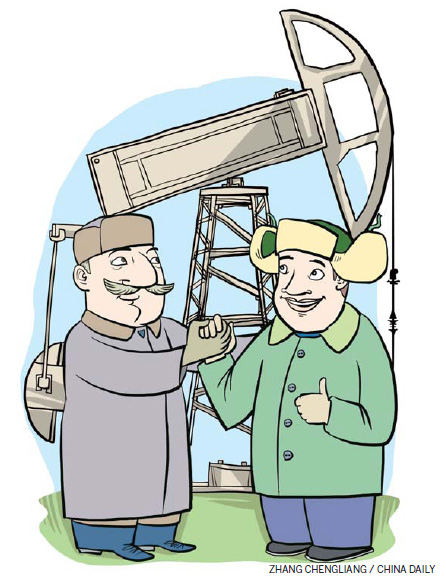It makes sense for China to walk away from gas deal
Updated: 2011-10-28 09:28
By Han Xiaoping (China Daily European Weekly)
|
|||||||||

When the Russian Prime Minister, Vladimir Putin, ended his two-day visit to China two weeks ago, media in China and Russia regretted that the two countries failed to sign the Sino-Russian gas cooperation agreement. But what it shows is that the relationship between the two is maturing, and that cooperation between the two is closer to what might be regarded acceptable international standards.
Under the Sino-Russian gas cooperation agreement Russia would transport 30 billion cubic meters of natural gas from West Siberia to China and 38 billion cubic meters from East Siberia each year. Russia is selling gas to Germany at $400 (288 euros) per thousand cubic meters. Even if Russia settled on a lower price with China, $350, Russia would still be expected to haul in revenue of $23.8 billion a year. If the pipeline can run for 30 years, that would bring in revenue totaling $714 billion.
However, if you use as a guide the long-term agreed purchase price that China gets in the current international liquefied natural gas (LNG) market and the cost of China's unconventional natural gas exploration, buying oil from Russia even at just $250 per thousand cubic meters makes no sense.
To get gas from West Siberia to the Chinese border port of Altai, Xinjiang Uygur autonomous region, it must travel 2,500 kilometers; for it to get from there to economically developed areas such as Shanghai and Guangdong province it needs to travel another 5,000 kilometers. Such huge transport logistics exist nowhere else. So even if the price was $250 per thousand cubic meters, it would still be too high.
The deal is fundamentally flawed, and it is little surprise that the two sides cannot reach an agreement. On gas prices, neither Russia not China can give in. If Russia gives China a lower price, how can it face consumers in Europe? If China accepts a price increase, how would it deal with other natural gas suppliers, particularly Turkmenistan and other Central Asian countries?
The US is changing the world through a quiet revolution, one that involves shale gas. The US consulting firm Cambridge Energy believes that the world is very rich in unconventional natural gas, which can change the rules of the game. The game rules talked of are not just to do with natural gas and energy. They may affect the game rules of the entire world geopolitical pattern. "Unconventional gas" refers mainly to shale gas, coal bed methane, tight sands gas and gas hydrates.
In recent years shale gas extraction and supply in the US have increased rapidly, and gas prices continue to decline, spurring competition with conventional natural gas. The output was 137.9 billion cubic meters last year, accounting for 23 percent of total gas production in the US. That reduced expected imports of LNG by 100 million tons. The US does not need to increase natural gas imports; indeed it has started exporting LNG, and the much vaunted "energy independence" is becoming a reality.
Advances in US unconventional natural gas technology directly affect the world's natural gas supply and demand. Many LNG projects worldwide, which had been oriented to the US market, are looking for new markets, and the prices are falling. In particular, a new round of global economic recession has made companies realize that the world economic crisis will not disappear any time soon. How long it will last is difficult to gauge, but now only a few countries such as China and India can continue to be active in the natural gas market.
Russia's desire to sell natural gas to China is born of market pressure. Over the years Russia has treated the resource as a tool to maintain its national strategic interests. It has frequently interrupted gas supply to make its voice heard, making European countries that import the gas feel vulnerable. Gaining energy independence from Russia has become the national energy strategy of such countries. In September Turkey threatened to terminate its gas contract with Russia if the price was not reduced.
With the end of the war in Iraq, the country's oil and gas production capacity is now on tap. Turkey aims to take over the havoc-ridden Egypt as the new leader of that part of the world. This requires Turkey to open more markets to the Arab world and increase energy purchases from the Arab states. The use of cheaper natural gas from Iraq is not only economical, but is also helping ease the security pressure on the Turkey-Iraq border.
Encouraged by the shale gas revolution in the US, European countries are trying to develop all kinds of natural gas. Recently, a huge amount of shale gas and tight sandstone gas was discovered in Germany, Poland and other European countries. Geological reserves in Europe are expected to surpass 120 trillion cubic meters. If its natural gas fields were developed, the endproduct would cost no more than the gas that Russia now sells to Europe. As in the case of the US, the effects of European energy independence would be felt worldwide.
As a matter of fact, there are abundant oil and gas resources around the world. The supply shortage of oil and natural gas is nothing less than a lie. In 1990, 125.7 trillion cubic meters of gas reserves had been detected worldwide, and at the time annual consumption was only 1.96 trillion cubic meters. By last year annual consumption had increased to 3.17 trillion cubic meters, and detected reserves had increased to a record 187.1 trillion cubic meters.
In 1980, just 667.5 billion barrels of oil had been detected worldwide. This had almost doubled to 1.21 trillion barrels by 2006, and the reserve-production ratio was 40.5 years. By last year proven reserves were 188.8 billion tons and the reserve-production ratio being 46.2 years.
The recent increase of international oil prices is mainly caused by speculation on Wall Street, not by supply and demand.
Recently US citizens have occupied part of Wall Street, protesting against financial speculators. Therein lies a warning for Wall Street. The price of energy will not surge in the way that it did in 2008. Oil and gas prices will stay relatively low because of the financial crisis, which is the last thing Russia would want to hear.
Another thing that would hardly be music to Russia's ears is the prospect of China becoming energy independent. For a long time Chinese have thought they lacked energy resources, especially clean and highly efficient natural gas, to support sustained economic development.
In fact the country is rich in both conventional and unconventional gases. What brings about a shortage of natural gas in China is a monopoly. Most of the resources are operated by PetroChina. But it has put most of its money into oil exploration, with an eye on rising oil prices. PetroChina complained that the domestic price of natural gas is too low and that things would change if the price was $350 per thousand cubic meters.
China has conventional gas reserves of 56 trillion cubic meters. We also have 100 trillion cubic meters of shale gas, 100 trillion cubic meters of tight sandstone gas, 36.8 trillion cubic meters of coal bed gas, 42 trillion cubic meters of combustible ice on land, 22 trillion cubic meters of combustible ice in the South China Sea, and other natural gases. The total, 356 trillion cubic meters, could help China in the quest for energy independence. If the Chinese government opened the energy market, the domestic supply of natural gas would develop rapidly.
Even if China did gain such independence, that does not mean it would stop imports. As the largest manufacturing country, it must open its market to the rest of the world to maintain balanced trade.
The author is chief information officer of China5e.com, a network devoted to energy related information. The opinions expressed in the article do not necessarily reflect those of China Daily.











